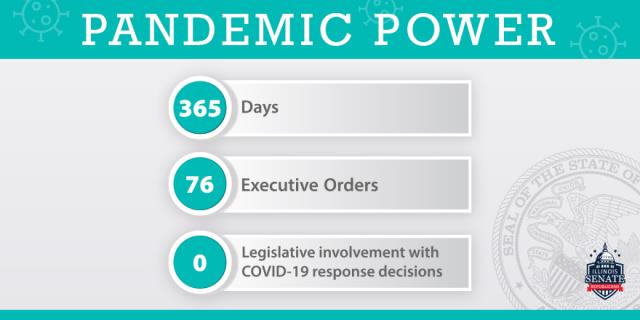Senate Week in Review: March 8-12
With vaccinations increasing and COVID-19 cases decreasing, Illinoisans are waiting for the next phase of reopening to begin, but the Governor hasn’t released any details about moving forward. The Senate did return to Springfield during the week, but activity under the Capitol Dome isn’t quite the same.
A year since first ‘stay-at-home’ order

It’s been a year since Gov. J.B. Pritzker issued his first “stay-at-home” order, without any input from the co-equal legislative branch. Senate Republicans have continually pushed for increased transparency from the Pritzker Administration, including access to data the Governor has used to make his decisions.
The Senate Republican Caucus has also continued to ask the Governor to involve lawmakers in making decisions that involve nearly every aspect of Illinoisans’ daily lives. Instead, Gov. Pritzker has chosen to operate unilaterally through 76 individual Executive Orders.

So far, the state’s COVID-19 response efforts have been marked with controversy, inconsistent standards for different regions, a broken unemployment benefits system, and relatively poor performance for the vaccination program.
Under the Governor’s Restore Illinois Plan, Illinois would not be allowed to resume normal operations until: “Either a vaccine is developed to prevent additional spread of COVID-19, a treatment option is readily available that ensures health care capacity is no longer a concern, or there are no new cases over a sustained period.”
With COVID-19 positivity rates continuing to decline, and vaccination numbers and hospital capacity continuing to rise, it appears those conditions have been met but the Governor still hasn’t released any details on how the state can move forward to Phase 5.
I am urging the Governor to work with lawmakers, healthcare and other stakeholders, and employers to develop a plan to ramp up the reopening process.
Back at the Capitol
 The Senate resumed its work at the Capitol during the week. Committee meetings were held using a combination of virtual and in-person meetings. While a limited number of reporters were granted access, citizens and lobbyists were not allowed to attend. The Senate resumed its work at the Capitol during the week. Committee meetings were held using a combination of virtual and in-person meetings. While a limited number of reporters were granted access, citizens and lobbyists were not allowed to attend.
Since the beginning of the COVID-19 pandemic, face-to-face citizen-involved government has unfortunately been put on hold. The January “lame-duck” session was particularly controversial for its lack of transparency.
Senate Republicans continue to push for improved transparency to restore what Illinois’ favorite son Abraham Lincoln had in mind when he described a government “of the people, by the people, for the people.” To help keep the public informed about legislative proposals that impact their lives, Senate Republicans suggest they watch Senate Committee meetings at https://www.ilga.gov/senateaudvid.asp.
A recent article from the Daily Line underscores the need for improvements in Illinois. In the article, reporter Joel Ebert noted, “According to the National Conference of State Legislatures, Illinois is one of just four states that don’t provide easy access to archived floor and committee meetings. As other state legislatures have modernized their technological capabilities, Illinois maintains an outdated system that critics say limits the public’s ability to engage with their government and fuels residents’ distrust of the General Assembly.”
To date, nearly 7,000 new proposals have been introduced that create new laws or change existing laws. The list of legislation introduced this year is available at http://www.ilga.gov.


|